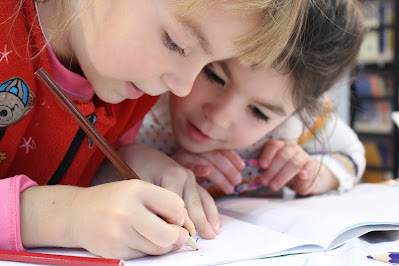life-long learning, the how and the why
- Get link
- X
- Other Apps
Life-long learning is the ongoing process of acquiring new knowledge, skills, values, and attitudes that can be applied to personal and professional growth. It is a mindset that encourages individuals to continuously seek out opportunities for self-improvement and growth throughout their lives. In today's rapidly changing world, life-long learning has become increasingly important as technology and globalisation have significantly impacted the job market and the way we live.
One of the biggest benefits of life-long learning is the improvement of cognitive function. Studies have shown that engaging in activities that challenge the brain, such as learning a new language or taking a class, can help to improve memory, concentration, and critical thinking skills. Additionally, life-long learning can increase employability by keeping skills and knowledge up-to-date, making individuals more marketable to potential employers. Furthermore, personal development is another key benefit of life-long learning, as it can help individuals to better understand themselves and the world around them, leading to greater self-awareness, self-esteem, and personal satisfaction.
Life-long learning can also bring about social and cultural enrichment. By learning about different cultures and ways of life, individuals can become more open-minded and tolerant, leading to stronger relationships and a more harmonious society. Additionally, participating in learning activities with others can foster a sense of community and belonging.
So how can you incorporate life-long learning into your life? Setting learning goals is a good place to start. Decide what you want to learn and set a timeline for achieving that goal. Finding learning opportunities can be as simple as visiting a library or browsing educational websites. Making a schedule for learning can also be helpful, by dedicating specific times during the week for learning activities. It's also important to stay motivated, by reminding yourself of the benefits of life-long learning and the progress you are making.
There are plenty of resources available for life-long learning. Online courses and tutorials are widely available and can be accessed from anywhere with an internet connection. Books and articles can also provide a wealth of information on a variety of topics. Workshops and seminars can offer hands-on learning experiences. Community college classes can be a great way to learn new skills or refresh old ones. Professional development programs can also be an excellent way to stay current in one's field.
In conclusion, life-long learning is a valuable and essential part of personal and professional growth. It provides numerous benefits, including improved cognitive function, increased employability, personal development, and social and cultural enrichment. Incorporating life-long learning into one's life can be achieved by setting learning goals, finding learning opportunities, making a schedule and staying motivated. There are various resources available, such as online courses, books, workshops, community college classes, and professional development programs, to help individuals achieve their learning goals. We should all strive to embrace the mindset of life-long learning and make a commitment to continuous self-improvement.
The benefits of life-long learning
The benefits of life-long learning are numerous and can have a significant impact on an individual's personal and professional life.
This can lead to better decision making, problem-solving abilities and overall cognitive ability. Studies have also shown that engaging in life-long learning activities can help to reduce the risk of developing cognitive decline and dementia.
Another important benefit of life-long learning is increased employability. As technology and globalization continue to rapidly change the job market, it's becoming more important than ever to keep skills and knowledge up-to-date. Individuals who engage in life-long learning are more marketable to potential employers, as they have a wide range of skills and can adapt to changes in the job market more easily. This can lead to better job security and career advancement opportunities.
Personal development is another key benefit of life-long learning. Through learning, individuals can better understand themselves and the world around them, leading to greater self-awareness, self-esteem, and personal satisfaction. It can also help individuals to develop new interests and hobbies, leading to a more fulfilling life.
Life-long learning can also bring about social and cultural enrichment. By learning about different cultures and ways of life, individuals can become more open-minded and tolerant, leading to stronger relationships and a more harmonious society. Additionally, participating in learning activities with others can foster a sense of community and belonging.
Furthermore, life-long learning can lead to financial benefits. Individuals who engage in life-long learning are more likely to have higher earning potential and be able to make better financial decisions. Furthermore, It can also lead to better financial stability and security in the long-term.
Moreover, life-long learning can also lead to better health and well-being. Studies have shown that individuals who engage in life-long learning activities have lower stress levels, better mental health and overall better physical health. It can also increase creativity and innovation, which can be beneficial in both personal and professional life.
Life-long learning is a valuable and essential part of personal and professional growth. The benefits of life-long learning include improved cognitive function, increased employability, personal development, social and cultural enrichment, financial benefits, and better health and well-being. It's important to embrace the mindset of life-long learning and make a commitment to continuous self-improvement.
How to incorporate life-long learning into your life
Incorporating life-long learning into one's life requires a commitment to continuous self-improvement and a willingness to seek out opportunities for growth. Here are a few strategies that can help a person to incorporate life-long learning into their life:
Setting learning goals is a good place to start. It's important to have a clear idea of what you want to learn and a specific timeline for achieving that goal. This can be as simple as deciding to learn a new language or take a class in a specific subject. Setting learning goals can help to provide direction and motivation, making it easier to stay on track.
Finding learning opportunities is another key aspect of incorporating life-long learning into one's life. There are many resources available, such as online courses, books, workshops, community college classes, and professional development programs. It's important to explore different options and find the ones that best suit your learning style and interests. The internet, for example, is a great resource for online courses, tutorials and educational videos. The library can be a great place to find books and articles on a variety of topics.
Making a schedule for learning is also important. Dedicating specific times during the week for learning activities can help to ensure that learning remains a priority. It's also important to be flexible with the schedule and adjust it as needed.
Staying motivated is crucial to incorporating life-long learning into one's life. It's important to remind yourself of the benefits of life-long learning and the progress you are making. Additionally, it can be helpful to find a learning partner or join a study group, as this can provide accountability and motivation.
Incorporating life-long learning into one's life also involves being open to new experiences and opportunities. This means being willing to try new things, even if they may be outside of one's comfort zone. It also means being open to feedback and taking constructive criticism to heart.
It's also important to be mindful of one's mental and physical well-being when incorporating life-long learning into one's life. Overloading oneself with too much information can lead to stress and burnout. It's important to take breaks and engage in activities that promote relaxation and balance.
Incorporating life-long learning into one's life requires a commitment to continuous self-improvement and a willingness to seek out opportunities for growth. Setting learning goals, finding learning opportunities, making a schedule for learning, staying motivated, being open to new experiences and opportunities and taking care of one's mental and physical well-being are the key steps to successfully incorporating life-long learning into one's life. It's important to remember that learning is a lifelong process, and the more one engages in it, the more they will reap its benefits.
Resources for life-long learning
There are many resources available for life-long learning. These resources can be broken down into several categories, including online courses and tutorials, books and articles, workshops and seminars, community college classes, and professional development programs.
Online courses and tutorials are widely available and can be accessed from anywhere with an internet connection. As of this writing, platforms such as Coursera, Udemy, and Khan Academy offer a wide range of online courses on various subjects, from computer programming to history to creative writing. Many of these courses are taught by experts in the field and are available for free or at a low cost. Furthermore, Websites like YouTube, also offer a wide range of tutorials and educational videos on various subjects.
Books and articles can also provide a wealth of information on a variety of topics. The library can be a great place to find books and articles on a wide range of subjects. In addition, books and articles can also be found online, through websites such as Amazon and Project Gutenberg.
Workshops and seminars can offer hands-on learning experiences. These events can be found through community organizations, universities, and professional associations. They can be an excellent way to learn new skills or refresh old ones.
Community college classes can be a great way to learn new skills or refresh old ones. These classes are often less expensive than university classes and can be taken on a part-time or full-time basis. Community colleges also offer a wide range of classes, from basic education to vocational training.
Professional development programs can also be an excellent way to stay current in one's field. Many organizations offer professional development programs for their employees, and these programs can be a great way to gain new skills and advance in one's career. Professional associations also offer workshops, conferences, and other events that can be a great way to learn new skills and network with other professionals in the field.
In addition to these resources, there are also many other opportunities for life-long learning. Volunteer work, for example, can be a great way to learn new skills while giving back to the community. Traveling to new places can also be a great way to learn about different cultures and ways of life. Furthermore, joining clubs or organizations can be a great way to learn new skills, make new friends, and pursue one's interests.
It's also important to note that life-long learning doesn't always have to be formal or structured. Learning through experiences and everyday activities such as listening to podcasts, reading news articles, watching documentaries, or talking to people from different cultures can also be a valuable way to learn.
In conclusion, there are many resources available for life-long learning. Online courses and tutorials, books and articles, workshops and seminars, community college classes, and professional development programs are just a few examples. It's important to explore different options and find the resources that best suit your learning style and interests. Furthermore, there are many other opportunities for life-long learning such as volunteering, traveling, joining clubs or organizations, and learning through experiences and everyday activities. The key is to be open-minded, stay curious and keep learning.
Is it possible to couple life-long learning and family life
Yes, it is possible to couple life-long learning and family life. In fact, incorporating life-long learning into family life can be a great way to promote personal and professional growth while also spending quality time together.
One way to couple life-long learning and family life is by setting learning goals as a family. For example, you can set a goal to learn a new language together or take a class on a specific subject that interests the whole family. Having a shared goal can be a great way to bond and motivate each other to achieve it.
Another way to couple life-long learning and family life is by finding learning opportunities together. This can be done by exploring online courses, workshops, or classes that are appropriate for all family members. Additionally, it can be a great way to spend quality time together by reading books, articles or watching educational videos or documentaries as a family.
Making a schedule for learning is also crucial. By dedicating specific times during the week for learning activities, it can help to ensure that learning remains a priority while also fitting it into busy family schedule.
Furthermore, incorporating life-long learning into family life can also be done by exposing children to different cultures and ways of life through travel or volunteering. This can help children to become more open-minded and tolerant, leading to stronger relationships and a more harmonious family life.
It's also important to remember that life-long learning doesn't always have to be formal or structured. Learning through experiences and everyday activities such as cooking, gardening, or DIY projects can also be a valuable way to learn as a family.
Incorporating life-long learning into family life can be a great way to promote personal and professional growth, bond and spend quality time together. By setting learning goals, finding learning opportunities, making a schedule, and learning through experiences and everyday activities, it's possible to couple life-long learning with family life.
- Get link
- X
- Other Apps



